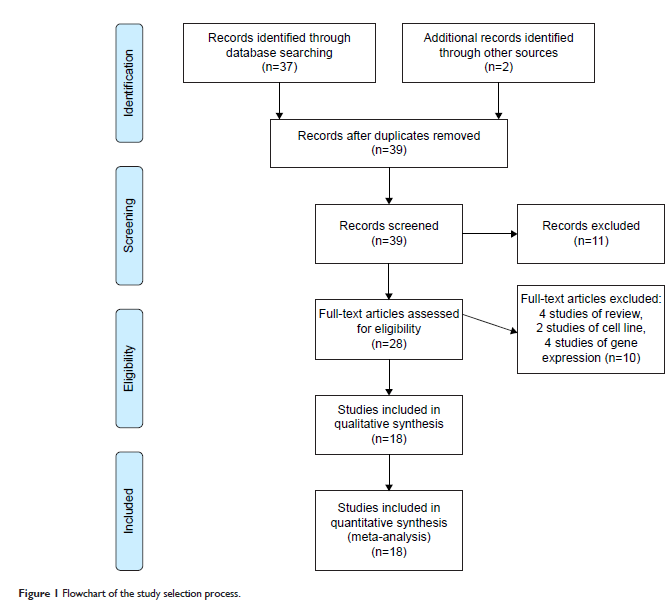9 0 5 7 8
论文已发表
注册即可获取德孚的最新动态
IF 收录期刊
- 2.6 Breast Cancer (Dove Med Press)
- 3.9 Clin Epidemiol
- 3.3 Cancer Manag Res
- 3.9 Infect Drug Resist
- 3.6 Clin Interv Aging
- 4.8 Drug Des Dev Ther
- 2.8 Int J Chronic Obstr
- 8.0 Int J Nanomed
- 2.3 Int J Women's Health
- 3.2 Neuropsych Dis Treat
- 4.0 OncoTargets Ther
- 2.2 Patient Prefer Adher
- 2.8 Ther Clin Risk Manag
- 2.7 J Pain Res
- 3.3 Diabet Metab Synd Ob
- 4.3 Psychol Res Behav Ma
- 3.4 Nat Sci Sleep
- 1.9 Pharmgenomics Pers Med
- 3.5 Risk Manag Healthc Policy
- 4.5 J Inflamm Res
- 2.3 Int J Gen Med
- 4.1 J Hepatocell Carcinoma
- 3.2 J Asthma Allergy
- 2.3 Clin Cosmet Investig Dermatol
- 3.3 J Multidiscip Healthc

已发表论文
miR-499 基因多态性与癌症易感性之间的关联关系: 一项综合分析
Authors Xu Z, Zhang E, Duan W, Sun C, Bai S, Tan X
Received 8 May 2015
Accepted for publication 21 July 2015
Published 20 August 2015 Volume 2015:8 Pages 2179—2186
DOI http://dx.doi.org/10.2147/OTT.S88224
Checked for plagiarism Yes
Review by Single-blind
Peer reviewers approved by Dr Chang Liu
Peer reviewer comments 4
Editor who approved publication: Professor Jianmin Xu
Background: MicroRNAs are a class of new noncoding RNA that play important roles in the pathogenesis of tumor. Rs3746444 in miR-499 is suggested to be associated with cancer susceptibility. In the present study, we assess the association between miR-499 rs3746444 polymorphism and cancer susceptibility through a meta-analysis.
Methods: We searched relevant articles from the PubMed and Embase databases. We screened all the resulting articles for adherence to the inclusion and exclusion criteria. The associations between miR-499 polymorphism and cancer susceptibility were estimated by computing the odds ratios (ORs) and 95% confidence intervals (CIs). All analyses were performed using Stata software.
Results: There are 18 datasets included in the analysis. Statistically significant associations were found between the miR-499 rs3746444 polymorphism and susceptibility to cancer (GG versus AA: OR =1.24, 95% CI: 1.01–1.52; G versus A: OR =1.11, 95% CI: 1.01–1.23). A subsequent analysis, on the basis of ethnicity for the population characteristic, showed that Asians had increased susceptibility to cancer (GG versus AA: OR =1.32, 95% CI: 1.09–1.59; GG + AG versus AA: OR = 1.17, 95% CI: 1.01–1.37). In the subgroup analysis of tumor type, none of the genetic models had statistically significant results. The meta-regression suggested that race and cancer types are not the source of heterogeneity in the present meta-analysis. No publication bias was detected by either the inverted funnel plot or Egger’s test.
Conclusion: Rs3746444 in miR-499 might be related to susceptibility to cancer.
Keywords: microRNA, single-nucleotide polymorphism, tumor, risk factor
Methods: We searched relevant articles from the PubMed and Embase databases. We screened all the resulting articles for adherence to the inclusion and exclusion criteria. The associations between miR-499 polymorphism and cancer susceptibility were estimated by computing the odds ratios (ORs) and 95% confidence intervals (CIs). All analyses were performed using Stata software.
Results: There are 18 datasets included in the analysis. Statistically significant associations were found between the miR-499 rs3746444 polymorphism and susceptibility to cancer (GG versus AA: OR =1.24, 95% CI: 1.01–1.52; G versus A: OR =1.11, 95% CI: 1.01–1.23). A subsequent analysis, on the basis of ethnicity for the population characteristic, showed that Asians had increased susceptibility to cancer (GG versus AA: OR =1.32, 95% CI: 1.09–1.59; GG + AG versus AA: OR = 1.17, 95% CI: 1.01–1.37). In the subgroup analysis of tumor type, none of the genetic models had statistically significant results. The meta-regression suggested that race and cancer types are not the source of heterogeneity in the present meta-analysis. No publication bias was detected by either the inverted funnel plot or Egger’s test.
Conclusion: Rs3746444 in miR-499 might be related to susceptibility to cancer.
Keywords: microRNA, single-nucleotide polymorphism, tumor, risk factor
